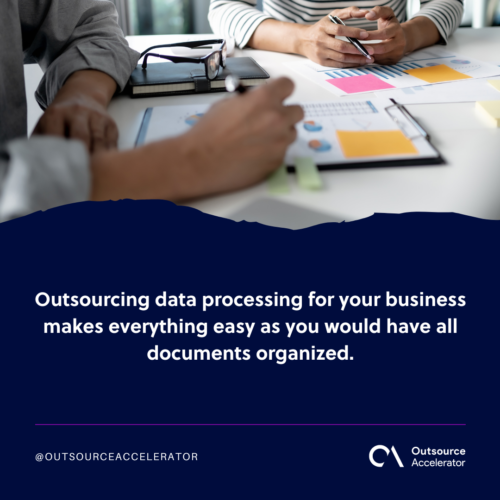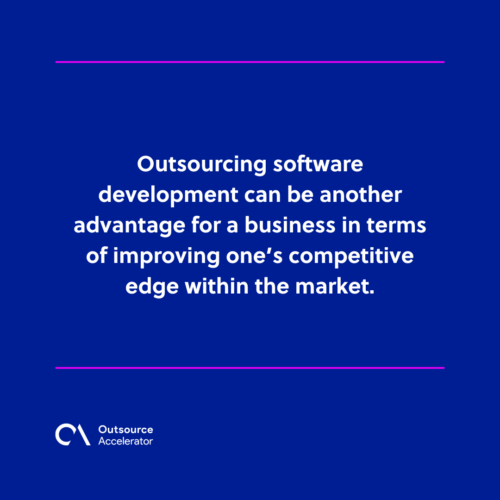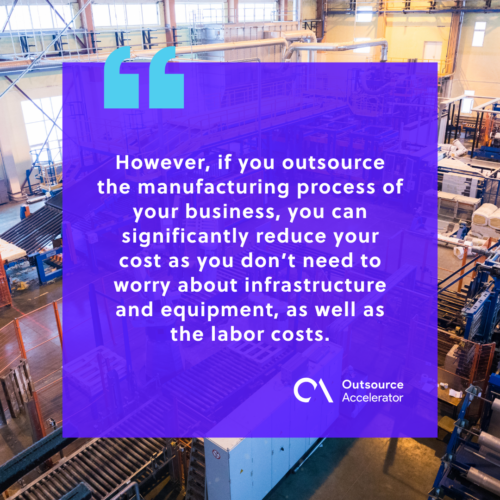How outsourcing can help make a business successful

When it comes to businesses these days, one has to be efficient to be successful, and that is often where outsourcing comes in.
One of the deciding factors that are responsible for making a business grow to “great” from “merely good” is how one utilizes modern process management techniques.
Business process outsourcing (BPO) is the modern way of running a successful business, where you utilize all factors and ideas to benefit your business the most.
This article will tell you how outsourcing works and how it helps your business. Learn what business areas you can outsource, the types of outsourcing, and a few more tips before you take a plunge into the industry.
What is outsourcing and how does it help your business?
You might ask, “What do you mean by outsourcing?”
BPO has been making its way into the business industry, changing how processes work. Outsourcing is a modern business practice of contracting particular work processes to a third-party provider outside the company.
It can include various services depending on what your business needs.
In most cases, a company outsources services to fill its supplementary business processes. It usually includes accounting, payroll, data recording, telephone customer service, and other tasks that are not considered part of the core business functions.
Outsourcing operations provide plenty of benefits, from small start-up companies to major corporations. For one, it boosts their competitive advantage in the entire market industry.
We can also define business function outsourcing as a business strategy to help cut overall operational costs while simultaneously growing the business and increasing its profits.
Because of that, there is a rapid growth in the outsourcing industry.
But how does outsourcing efforts really help businesses not just to strive but also gain success in their respective fields and niche?

2 types of business process outsourcing services
To explain how outsourcing works, you need to understand the two basic types of outsourced services – the front office and back office work.
Front office
The business’s front-office services are all about contracting services that involve it, such as technical support and marketing.
Customers come into immediate contact with the front office employees. It is usually the company’s reception and sales area.
Back office
Back office services, on the other hand, pertain to internal processes such as billing and purchasing.
While these services work differently, outsourcing functions as a process that can combine, unlike services, making them work together instead of working independently.
Such operations, when not kept under tight reins, can cause a huge drain in both the company’s resources and budget.
Any cost-cutting method or strategy is always helpful, and outsourcing is well on its way in that case.
BPO firms like Hugo allow businesses to fulfill their processes and obligations to both their employees and customers. Along with supporting business continuity, companies can also keep tight control of their overhead costs.
BPO also has a significant potential to free up employees’ valuable time within the company. Outsourcing non-core activities helps in-house employees allot more of their time to create better strategies for business growth.
The basic point of outsourcing is to bring in external specialists and knowledge to take over specific roles that would otherwise crowd the employees’ task lists. Or those that do not perform well because of the lack of employee expertise.
That being so, there are a number of significant advantages of outsourcing operations to various kinds of businesses.
Planning ahead: Why do you need to outsource?
One of the most obvious benefits of outsourcing is reducing business costs. It gives a company the means to keep its overheads on a tight rein while simultaneously growing the business.
BPO doesn’t only provide advantages in terms of core products and services either.
It also helps optimize the business’ complementary areas and the knowledge of the new and emerging markets and trends to get ahead of industry competitors.

Advantages of business process outsourcing
From small start-up businesses to major corporations, outsourcing work can provide countless benefits. Companies of various sizes can outsource their processes as the business demands continue to grow.
BPO serves as an innovative service that helps businesses get ahead of their respective industries.
1. For solopreneur
In truth, outsourcing works not only for those multinational companies as what most people believe.
Even solopreneurs like online retailers can take advantage of outsourcing providers to support their daily operations.
Running your own company or brand can be taxing at the best of times. Whether you like what you do and that you are passionate about it, there will be times that daily tasks add up.
At times, you may think that there’s not enough time everyday to do everything.
Making a business successful is not an easy feat, even with a lot of employees doing specific work. What’s more, if you only have yourself to run the whole process.
Offshore outsourcing for solopreneurs can increase the efficiency and speed of their daily functions. You can’t handle all specific business operations by yourself all the time and still expect that your company will be efficient and successful.
A reliable outsourcing company can take charge of menial tasks within your organization. In turn, you will be able to maximize your time and resources on your core competencies. Especially in mapping out your plans to produce more high-quality products and services.
2. For SME companies
There is a growing trend of small and medium business enterprises, which significantly boost economic growth. They also carry the potential to grow even more with the advantages of offshoring activities.
While most people believe outsourcing can be expensive for small-scale businesses, that is not true.
BPO is considered a cost-efficient solution that can work not only for large companies but also for SMEs. Even a small business can cut its overhead cost and payroll costs through outsourcing.
For small businesses, there are certain problems and issues regarding employees’ expertise toward specific roles.
It can often hinder the company’s growth. SMEs can delegate job roles with specific expertise to their outsourced workers.
Outsourcing contracts guarantee that your company would have a high-quality output from professionals.
When asked how outsourcing works for SMEs, it will include gaining high flexibility and achieving financial freedom. It also makes business operations efficient, saving time and resources significantly.
Furthermore, it gives freedom to choose what business tasks you want to retain within the company and what to outsource from outsourcing providers.
You won’t have to worry about the burn of having too much to work daily anymore.

3. For large corporations
What can multinational companies benefit from this business practice?
Large corporations are often hard to work around, as there is always an influx of tasks to accomplish. There are far more deciding factors to consider to achieve the company’s success.
As such, it is mostly hard and taxing to have seamless daily operations.
The main reason why large corporations should consider outsourcing some of their business processes is to lower costs. It significantly reduces business expenses for manpower, additional office space, and equipment costs.
Large companies tend to have a large number of employees. With that, there should be an allocated amount for traditional manpower costs, including work and compensation benefits.
However, with outsourcing, fixed costs like this can be reduced. Financial resources can be directed to revenue-producing processes to achieve business growth.
Work efficiency is also a touch and go when it comes to large corporations, as it is hard to have a tight rein on all employees and particular functions.
With outsourcing, you get an advantage in terms of time-driven operations. It also eliminates the need for in-house employees to multitask.
It gives them more time to focus on developing strategies and competencies to achieve operational demands.
No matter how large a business is, there is still no guarantee that in-house employees cover all business expertise. BPO provides this access to industry experts and trained personnel specializing in a particular niche to improve the business’ performance.
10 reasons why outsourcing business functions is a must
Outsourcing has served small to large companies the greater good for their businesses. It has become a common strategy for 21st-century companies, giving them countless benefits.
Below are ten key advantages of outsourcing to third-party providers:
1. It reduces and controls the operating costs but increases revenues
Outsourcing eliminates the need to hire permanent or full-time employees. It brings in a flexible workforce to perform tasks and will only be paid when needed, thus reducing operating costs significantly.
2. It helps you maximize the use of external resources
A BPO also gives businesses means to maximize the use of their external resources, cutting other expenses, such as shipping and production costs.
By moving certain business processes elsewhere wherein such materials are easily obtained, costs can be a lot cheaper.
It also reduces or eliminates infrastructure costs as it will become the responsibility of third-party providers.
3. It enables the company to gain access to world-class capabilities
Whether it’s offshoring, domestic outsourcing, or nearshore outsourcing, it can give you access to put your business within the increasingly global market.
Depending on where you send a part of your business functions, you can also take advantage of the time zone differences. It can make your company operate 24/7.
4. It can free up internal resources for other purposes
Outsourcing your business to external service providers can give your company resources that otherwise aren’t available in-house.
It can also free up your business resources that would otherwise be used in fulfilling back-end functions.
5. It requires little to no initial capital investment
Outsourcing eliminates the need to put in a huge capital investment. Especially for things like infrastructure, employee recruitment, training, and daily production expenses.
6. It provides you access to trained and expert specialists
It gives you access to expert professionals in their respective fields. These specialists can perform services with high-quality output that would otherwise be sub-par if produced in-house.

7. It allows you to focus on the core competencies of your business
Contracting parts of your business functions to an outsourcing company doesn’t only cut your business’ overhead costs.
It also gives you extra time, something you can use to focus on the company’s core competencies.
This way, you will have the means to emphasize business processes that are otherwise crucial in terms of sales and revenue.
8. It reduces the training and labor costs of the employees
When you outsource parts of your business processes, you eliminate the need to recruit, hire, and train employees.
Third-party providers are responsible for providing proper training and all necessary resources needed for your outsourced workers to perform their roles.
9. It gives you instant access to world-class skills
Contracting business processes from third-party providers gives you access to world-class talents, making you competent in your field.
Thus, choosing the right outsourcing company in the industry ensures that you get the best output possible.
10. It ensures 100 percent security in the billing process
Billing process is one commonly outsourced service. Outsourcing relieves your staff from the hassle of doing the billing process.
Your chosen outsourcing company can provide a transparent billing process that is also well-secured from any hacking attempt. There is no need to worry about sharing your company’s confidential information as it will be protected.
Business areas that you can outsource
You now know the meaning of outsourcing, what outsourcing does, and how outsourcing works.
With all the advantages of outsourcing parts of your business functions, there will be no questions like, “How does outsourcing work?” or its relevance.
To further this business function outsourcing explanation, here are some distinct business areas that you can outsource from external service providers.
Outsourcing administrative tasks
Company and business administration is simply composed of day to day operational activities.
More often than not, employees spend too much of their time focusing on admin tasks, leaving little to no time to develop the core aspects of the business.
It is why most companies start to outsource some of their administrative functions.
To fully understand the meaning of outsourcing services in the administrative side of the business, here are the common admin tasks that you can outsource from a third-party service provider.
· Data entry
Typing and data entry work takes a lot of employee time. Instead of spending hours of the day typing your business data, a third-party service provider can do this job for your business.
Your business data can be arranged and filed without allotting many hours to do it.
· Travel management
Having someone who focuses on your travel management can come in handy, ensuring you have the necessary reservations and airline tickets you need.
While some software can help with this, having someone makes it easier, especially when an issue must be resolved.
· Scheduling
Running a business is hard and would usually keep you busy. Having someone who arranges and organizes your schedule always helps.
You don’t have to worry when there are people you have to call or places you have to go if you have someone that regularly reminds you of these schedules.
· Typing
Typing jobs, especially the bulk ones, can be time and effort-consuming. Instead of doing this in-house, typing can be outsourced outside your company, freeing up the time to focus more on the efforts to grow the business.
· Personal assistant
Hiring a virtual assistant is quite the same as duplicating yourself. This way, you can focus more on the more pressing issues of growing your business.
· Data processing
Data management and processing is not an easy task. It is usually time-consuming, whether it is as simple as entering data on Microsoft Excel or Word.
Fetching data whenever needed can also take so much time, especially if you don’t have it organized.
Outsourcing data processing for your business makes everything easy, as you would have all documents organized.

Outsourcing customer support
What are business function outsourcing services when it comes to improving customer support for a business?
· Sales moderation
Sales moderation is a technical business function. If you are no expert in this area, it would always help to have an expert do it for you.
· Customer service
Call centers are among the commonly outsourced services, especially with the growing number of customer complaints, concerns, and needs.
It is smart to have customer service experts focused on keeping the customers engaged and happy since they are the most valued asset of any business.
· Live chat support
Live chat support systems can also be outsourced for the same purpose as outsourcing customer service.
· Community moderation
Outsourcing can be an excellent option for companies and businesses with a rapidly increasing online community.
Instead of doing it in-house, having third-party experts handle this technical function can be convenient, saving you both time and expenses in training current employees or hiring new ones.
Outsourcing financial and accounting duties
It’s always better to keep your financial data and accounts organized all the time than trying to catch up on the duties at the end of the year when you need them.
It can be time-consuming and tedious to scramble when the tax season comes.
However, maintaining an organized book takes time and focus and will usually push you to hire an in-house accounting team, which can be an additional labor cost.
Fortunately, there are some financial and accounting duties that you can outsource. Here are the top outsourced services for accounting and finance.
· Bookkeeping
Working with a bookkeeper outside your business is much easier, especially with the available cloud-based accounting software. It would even be easier to outsource a professional for this specific business function.
You can simply send the business account data that your bookkeeper wants to organize, and they will send you the reports you want.
Outsourcing the services from a bookkeeper also eliminates the hassle when it comes to taxes.
· Invoicing
Choosing to outsource your business’ invoice processing can save you all the hassle. It can give your company a better business operation by giving regular, accurate, and timely invoice management.
· Accounts payable and receivable
One of the best ways to reduce costs and expenses in your business is through invoices, particularly in accounts payable and receivables or AP and AR.
Business function outsourcing helps companies improve their compliance in terms of internal controls, saving a huge chunk of money.
It also helps streamline AP and AR conveniently without spending huge daily hours doing the job.
· Financial reporting, analysis, and planning
Financial reporting can be tedious, especially if it’s not streamlined and organized well. It can also take a lot of time to prepare different kinds of reports and analyses to identify how the company is doing financially.
Outsourcing financial reporting services can be a great option to make this process seamless and efficient.
With outsourcing, you can save time that is usually involved in analyzing financial documents and preparing reports.
Financial reporting software can streamline this process if you do it internally but you need to make the choice that’s best for your business.

Outsourcing IT operations and management
How does information technology outsourcing work?
Here are the common IT business functions that can help you understand more what outsourcing means in IT service functions.
· IT support
System
No matter what the size of your business, glitches in your system, like crashing servers and websites, corrupted data, and malware attacks, can be a pressing issue.
These are instances when an outsourced IT support system can come in handy. It is also much cheaper than having an in-house IT team.
Network admin
Aside from a secure system for your business, outsourcing a network admin can also be advantageous in maintaining a seamless process within the company.
· Creative services
Website design
An excellent website can make or break your online presence. If you are not an expert, website design can be quite a challenge, so hiring a professional can be helpful.
Not only would it save you time and energy, but it would also give you a quality output – a website that can provide you with high customer satisfaction.
Graphic design
Unless you are a professional in graphic design and digital presentations and you have so much time on your hands, outsourcing this task can do you a lot of good.
A slideshow designed by a professional can go a long way; it also allows you to save time in rehearsing the presentation.
Web development
It is always a great choice to leave web development and maintenance to an expert.
Business owners should be more focused on growing the business and ensuring the quality of products and services instead of spending a lot of time maintaining an e-commerce website.
Software development
Outsourcing software development can be another advantage for a business in terms of improving one’s competitive edge within the market.
It’s a strategic approach for every company. Instead of the costly in-house software development, outsourcing makes an obvious choice in terms of cost-effectiveness.
Lack of in-house expertise in this area is another problem, and training employees to be competitive in this regard can take a lot of time and money.
On the other hand, with outsourcing, you have a guarantee that an expert or a professional is doing the job for you.
Animation
A lot of entertainment companies, small or large corporations, usually outsource animation services. One of the main reasons is to cut costs, contracting pre-production tasks from studios overseas where costs are cheaper.
Storyboard
Outsourcing storyboards and creative design can provide a lot of benefits. Aside from cutting time and costs in doing it in-house, outsourcing also provides access to skilled professionals outside of the company.
You can also take advantage of their international exposure and excellent infrastructure, which are otherwise not available in your company.

Outsourcing human resources (HR) functions
Hiring and training new and existing employees can often be a rigorous task for the human resource department.
Usually, it takes so much of the employees’ time that they can otherwise use it to give attention to core business functions.
This is why human resources are among the common tasks being outsourced. Here are some examples of how you can define outsourcing jobs in HR business functions.
· HR support
Outsourcing to human resource support can help a business manage a wide range of HR functions that you might otherwise contract from multiple third-party service providers.
That includes payroll processing, recruiting, employee training, and benefit plan management.
· Medical billing
There are a lot of advantages to outsourcing medical billing. Every reason works toward making the entire billing process easy and convenient.
Instead of spending a lot of time taking care of the billing documents, employees can have more focus on their patients.
Hiring a professional to do the process also helps reduce billing errors, especially when dealing with health insurance processes. It ensures accurate and proper billing compliance.
· Insurance support
Outsourcing insurance support helps drive innovation in business processes, as well as greatly improves customer service.
Outsourcing sales and marketing
· Brand development
Marketing and developing the brand of your business can take up a lot of time and effort. Since time is a precious commodity when running a business, having an expert can come in handy.
An expert in this field can also help in developing a better strategy to build brand awareness.
· Press release
Press releases can be used by businesses to gain media coverage or for search engine optimization purposes. However, it takes effort given that a press release can be either good or bad, and the latter will be ineffective, thus, a waste of money.
Outsourcing press release services from someone who knows how to do it right can help your business do a great deal.
· Online marketing
Social media marketing
Social media marketing is extremely helpful and advantageous in keeping the business relationship with current customers and connecting to new ones. However, it can often be tedious as you need to regularly post social media updates.
Finding a tech-savvy professional who can manage the company’s Facebook, Instagram, Twitter, Pinterest, and other social media platforms can save you both time and energy.
Content marketing
Aside from social media, creating quality content is also an excellent marketing strategy to bring your business to the market.
But again, it takes time and effort to create and produce content that will make you relevant in your chosen niche.
Fortunately, you can hire a content writer or a content marketer to do this tedious job, making outsourcing article production that much easier.
SEO and PPC
Simply making content would not bring your business to the top.
Especially if you want to be relevant in your field or if you want your brand to appear on the first page of search engine results, you have to be familiar with SEO and PPC marketing strategies.
Training an employee for this job takes time and money. A more cost-effective option is to find a professional who can optimize your content for your business.
Email marketing
Any type of marketing campaign also takes a lot of time and effort and email marketing is not an exception.
Fortunately, you can outsource this marketing task to someone outside your business, someone who knows how to do it right.

Outsourcing back office admin and support
What does outsourcing business function mean to back office support?
Here are some of the examples of what back office jobs you can contract from external service providers.
· Lawyers and paralegals
When it comes to cost savings, is outsourcing legal services an excellent move?
With legal services outsourcing, firms can lower their costs through labor arbitrage or the difference between the labor costs of an in-house law firm and outside vendors.
· Real estate
Outsourcing in real estate can ensure that you have someone who is an expert and can give you best-in-class solutions, especially when optimizing space for your business.
· Management and administration
Business management and administration involves a handful of daily tasks and usually takes employees’ focus from core business functions.
Having a third-party service provider to manage these taxing tasks, you will be free to focus and improve control on growing your business
Internal guide to starting business process outsourcing for your company
Learning how outsourcing works is extremely important before jumpstarting your outsourcing venture.
You simply can’t do it and make your business successful without the necessary knowledge about the strategy and the entire outsourcing market.
What are the different types of outsourcing?
Knowing and understanding the following outsourcing models can help you choose which kind best fits your business:
· Professional outsourcing
When running a company, there are times when your own employees can’t accomplish complicated business tasks and processes.
This might be due to a lot of factors. Employees might lack proper training to complete a certain role, not have enough time, or lack the necessary tools to complete such operations.
In these cases, it is more economical to outsource professionals than hiring one.
Professional service outsourcing is considered as the most common type of outsourcing as it can help save massive amounts of cash on overhead costs. Common professional services being outsourced include accounting and legal.
· IT outsourcing
Information technology outsourcing has been highly in demand these days.
It pertains to contracting technology-related services and resources for a part or the entirety of an information technology business function.
IT outsourcing explains a common business process that is used for infrastructure, maintenance, development, and technical support. Every business has IT needs as it deals with technology on a certain level.
An example of IT outsourcing is contracting an IT management team for a business, eliminating the need to build an expensive in-house IT team.
It can also be outsourcing data storage as buying one for in-house use can be expensive, and maintenance can also cost a lot of money and resources.
You can utilize some IT outsourcing articles to learn more about how it works and why it can work for you.
· Multisourcing
Multisourcing can be applied to any business area but is most common in outsourcing IT services. Simply put, multisourcing combines outsourcing IT services and other business functions from external service providers.
Multisourcing forms the best-of-breed teams to achieve business goals.
It operates in a manner where the business creates a partner relationship with other providers and is outcome-focused as it provides a clear view of the status of the projects.
This type of outsourcing mostly requires a business to have a comprehensive strategy and a network of governance and relationships.
· Manufacturer outsourcing
Production costs, when done in-house, can be extremely expensive, especially if the raw materials you use are sourced elsewhere.
Aside from the high cost of the raw materials, paying for the factory workers can also be massive, as well as the capital for infrastructure and equipment you need for manufacturing.
However, if you outsource the manufacturing process of your business, you can significantly reduce your cost as you don’t need to worry about infrastructure and equipment, as well as labor costs.

Manufacturing outsourcing has become common and is usually industry-specific. For example, in the auto manufacturing business, one can outsource the building and installation of their car windows.
This type of outsourcing is not only applicable to such large corporations; it can also be advantageous to small-scale businesses that want to compete with the bigger businesses in the market.
It provides the means to scale up manufacturing products without hiring a lot of personnel and upgrading equipment.
However, as much as manufacturing outsourcing can significantly cut costs, it does come with a certain level of risk, especially in terms of quality issues.
· Process-specific outsourcing
There are outsourcing processes that are specific to a certain task or an internal procedure, something more known as process-specific outsourcing.
It has become common in the industry to contract an external service provider specializing in a particular service.
For example, a retail service can outsource its delivery services to a particular company, especially for their international shipping.
This type of offshore outsourcing method usually has a very comprehensive contract, which includes detailed things like the delivery timeline, product costs, and customer contacts.
Process-specific outsourcing provides businesses the means to not only cut costs but also have the time to focus more on their core business functions, saving the time it usually takes to fulfill customer orders.
· Business Process Outsourcing
Business process outsourcing is the most common type of outsourcing, and it deals with contracting any business process to a third-party service provider.
It is especially common in the manufacturing industry, outsourcing necessary business operations as there are quite a bit of tasks and steps to be done to achieve a high-quality end result.
For example, equipment repair and machine maintenance can be outsourced from an external service provider instead of creating an in-house team for the job.
It will cut costs, especially since it keeps you from putting in employees under your payroll for a non-daily task.
You can also outsource other common operational tasks such as cleaning services, landscaping, property management, and facilities maintenance.
· Project outsourcing
When companies are juggling several projects, it can usually be tedious, and the quality of the output can be compromised by the lack of time to focus on each one of them.
In this case, a business can outsource a project to a third-party. A whole project can be contracted, or a part of it can be subcontracted.
There are various reasons why a company outsources a project, but the most common one is the lack of available people to do and finish the task or the lack of skills for the job. It is also a more cost-effective choice compared to spending time and money on training current employees.
· Offshore outsourcing
Offshoring or offshore business function outsourcing simply means contracting a part of your business process in another country, which is a strategy to lower labor expenses. Other countries require cheap costs to finish a certain task compared to doing it locally.
In addition, offshoring is also done to tap the global skills offered by other countries as well as enter new markets in the hopes of becoming global.
Firms like Boomering specialize in several verticals, such as business support, IT, and marketing, working as offshore extensions of their client’s in-house team.
Offshoring has also become an accepted idea to overcome local regulations that prohibit particular activities.
· Reshoring
While there are companies that find hiring offshore labor a cost-effective move in the contracting business process, some find it the opposite, and they start to bring back offshoring activities locally.
It is commonly known as reshoring, which can simply be described as transferring a business operation from another country to the business’ home country.
Reshoring can have several advantages, especially in cutting product shipping costs as oil prices have risen. It also helps answer the issues of time delays, long shipping times, and customs charges in having the production service in another country.
Some businesses even go further as to bring their outsourced services in-house, called insourcing.
· Nearshore outsourcing
Nearshoring lies between offshoring and reshoring business functions.
Instead of bringing back the outsourced services from a far-away country locally, some companies choose to move their business operations to geographically close countries.
Its main purpose is to improve services by lessening the allotted time for shipping and time delays, which are common issues in offshoring, while still cutting costs by finding the nearest country where labor services are cheaper than doing processes locally.
Basically, this type of outsourcing combines the benefits of reshoring and offshoring and combating the risks of both.
Recognizing the pricing, labor costs and internal revenues
One of the main reasons businesses and companies outsource parts of their business processes is to save on costs and expenses while increasing sales simultaneously.
Outsourcing price is usually the selling point in choosing where to outsource. However, before outsourcing a business function, it is important to specify what functions you want to outsource and the output quality you expect.
It will help identify if outsourcing that function is as cost-effective as you realize compared to doing it in-house.
Calculating the in-house costs of a business function you wish to outsource would also help you verify how much you are about to save.
Calculate both outsourcing costs and in-house costs, deduct the latter from the former, and you can derive your total cost savings.

Outsourcing vs. offshoring: Knowing their difference and importance
Business function outsourcing and offshoring work to achieve quite a similar goal of finding a business process strategy that can help businesses cut labor, operational, overhead costs, and other expenses, while simultaneously increasing revenue and sales.
However, outsource and offshore strategies differ in some ways, especially in how they work. Outsourcing is explained as contracting a business process to a third-party service provider.
This could mean contracting out work to a third-party provider that is in the same country as the hiring company.
Offshoring or overseas outsourcing, on the other hand, takes advantage of having an offshore center. It sends business functions to a different country.
Outsourcing vs. offshoring: What is the most preferred method?
When it comes to benefits, both outsourcing and offshoring can give advantages to the business. For one, outsourcing is a go-to business strategy for its cost advantages.
It is the chief motivation of businesses to contract work to third-party service providers instead of building an additional team in-house.
Another outsourcing benefit is saving time in doing seasonal and menial tasks to focus more on core competency and growing the company.
In times when a business doesn’t have expertise in certain business activities in-house, outsourcing can also be an excellent option.
Offshoring also provides similar benefits as outsourcing. It’s a cost-saving opportunity for offshore outsourcing companies who don’t want to invest in their own infrastructure, additional employees, and necessary equipment.
Outsourcing offshore also opens up a chance for your business to take advantage of competitive skills that can give them a global edge in the market.

Choosing between outsourcing and offshoring mainly depends on what is more ideal and beneficial to the business. However, offshore outsourcing is also an advantage in combining the two.
It is to take advantage of both strategies, including achieving a more specialized skill that is otherwise not available in-house.
It’s also a great middle ground for lowering costs and expenses, but gaining a higher productivity and revenue.
While both practices have countless benefits, they are also susceptible to problems and risks. Before companies outsource, it is also important to know and understand the disadvantages of outsourcing.
While it makes the business process more convenient, it still adds complexity along with the challenge of having an external organization.
This is why it is crucial for both the client company and the service provider to have a good outsourcing relationship.
When do you outsource or offshore your business?
The strategy of business process outsourcing has become common in a lot of businesses.
No matter the size of a company, whether you run it by yourself or are part of a large corporation, outsourcing or offshoring can be extremely beneficial.
These two can be an excellent choice for cost-cutting efforts in a business. For one, contracting your work outside the company where the labor cost is cheaper can save you a fortune.
Lack of expertise in a certain business function is also a reason to outsource or offshore. This is why you must always make sure to partner only with reliable and competent outsourcing firms like MVP Asia Pacific
There are cases in which you can either outsource or offshore depending on what works best for you, for example, choosing where to contract your production.
However, there are times that a particular business process can be outsourced, but it is not advisable to be offshored like legal services.







 Independent
Independent




